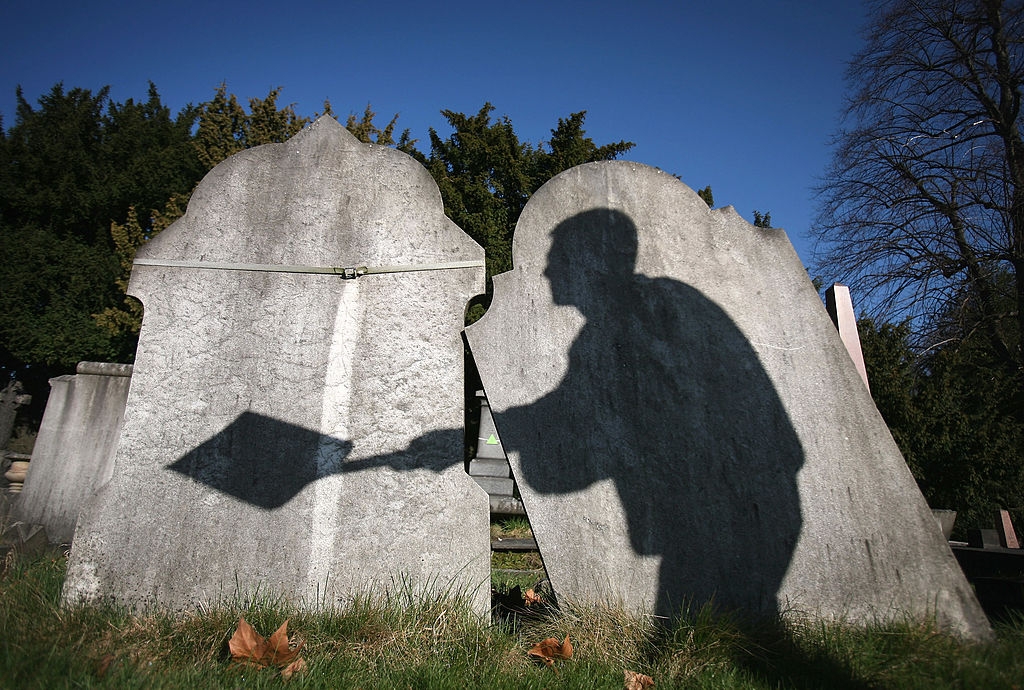I once asked a hospice nurse to describe her job and was surprised when she likened it to midwifery. ‘There are two days,’ she said, ‘which aren’t the full 24 hours. The day you are born, and the day you die.’ Uncertainty, fear and waiting. Having been at my late-wife’s deathbed – and at her side as she gave birth to our children – I can see the analogy.
But why, when it comes to the language of inclusivity, is death excluded? Or, as the Brighton and Sussex University Hospitals NHS Trust, asserted recently ‘there is currently biological essentialism and transphobia present within elements of mainstream birth narratives and discourse’.
Why stop at births? This is a hospital we’re talking about. Lives don’t just start there. What about death ‘narratives’? If breastfeeding mothers are out, and ‘birthing people’ who ‘chest-feed’ are in, where does that leave widowers like me?
Since the word began appearing in Medieval English, a widower has been a husband deprived by death of a wife. Or, since the legalisation of gay marriage, a husband who’s lost a husband.
Widowhood has a bigger semantic problem
The definition may have been modified, but it is still one which stubbornly reflects biological sex. If JK Rowling got into hot water for questioning if ‘people who menstruate’ was really such an improvement on ‘women’, is there a Twitter storm brewing for widows and widowers who don’t much like ‘people who grieve a lost spouse’? If even Mr Potato Head is forced to yield to a ‘gender neutral makeover’, what chance does widowhood have?
There is a case for reform. Widow and widower may be paired words, but in the hands of those who use them – journalists like me – they can reinforce gender stereotypes. Research nearly a decade ago found that the word ‘widow’ was used far more than ‘widower’ in British newspapers. Widow is often used in headlines where the woman’s marital status is of no obvious relevance. The study showed that, in one year, there were 729 widows and and 114 widowers in the Daily Mail. The Guardian, that bastion of even-handedness, fared little better. It had 475 widows, to 50 widowers.
Premature spousal death does take off rather more men than women, but not in these proportions. It’s just a trope; the ‘tragic widow’, the ‘merry widow’. Apt for a time when women were economically vulnerable to widowhood in a way that men simply weren’t. Hardly applicable, in this country at least, any more.
But widowhood has a bigger semantic problem. Not about distinguishing between men and women, but between the living and the dead.
As a presenter at Sky News until my resignation last month, I often found myself correcting younger colleagues who seemed reluctant to give widowhood its lexicological dues. A female celebrity loses her ‘battle with cancer’ and a ‘tribute is paid’ by her ‘husband’. No he’s not, I would point out. Not any more.
Partly this is about the understandable unwillingness of the young to look death squarely in the face. But it also reflects a generational sense that the precision of words matters less than it did. We were warned about the effects of this linguistic regression by George Orwell in 1984. Big Brother uses News-Speak to denude the language, to strip away the specific meanings of words, without which the thought itself cannot come to life. If you’ve never heard of the word ‘widower’, your understanding of life – and death – shrinks a little.
Of course I could call myself a single-parent. It’s what I am after all. How and why does it matter how I become one? Yes, I took vows and stuck by them, until parted by death. But is that so very different from a spouse who reluctantly accepts the wishes of an estranged partner who wants out?
The problem is that ‘single parent’ is just too broad. As a former features editor at the Daily Telegraph once admonished me: ‘Journalists should never deal in generalisations’. It might salve the conscience of those who fret about the ‘deserving’ and ‘underserving poor’ to bracket me with the 17-year-old pregnant teen, but it’s hardly a granular depiction of reality.
So what has any of this got to do with ‘chestfeeding’? Well, I predict widowhood will outlive inclusive language engineering. In coming years, fewer people might call me a widower, but only because it feels passé, like ‘bachelor’ or ‘spinster’.
Yet the idea that we should use gender-neutral ‘single-parent’ or ‘surviving spouse’ is for the birds. Why? Because even the sans culottes of the Brighton and Sussex University Hospitals NHS Trust know you can’t be empowered by death. If doing down ‘biological essentialism’ is about equality and the advancement of the unlucky or victimised, where does that leave me and my ‘lived experience’? I don’t feel especially ‘privileged’ to have lost a wife of 20 years, while gaining sole responsibility for six young kids.






Comments